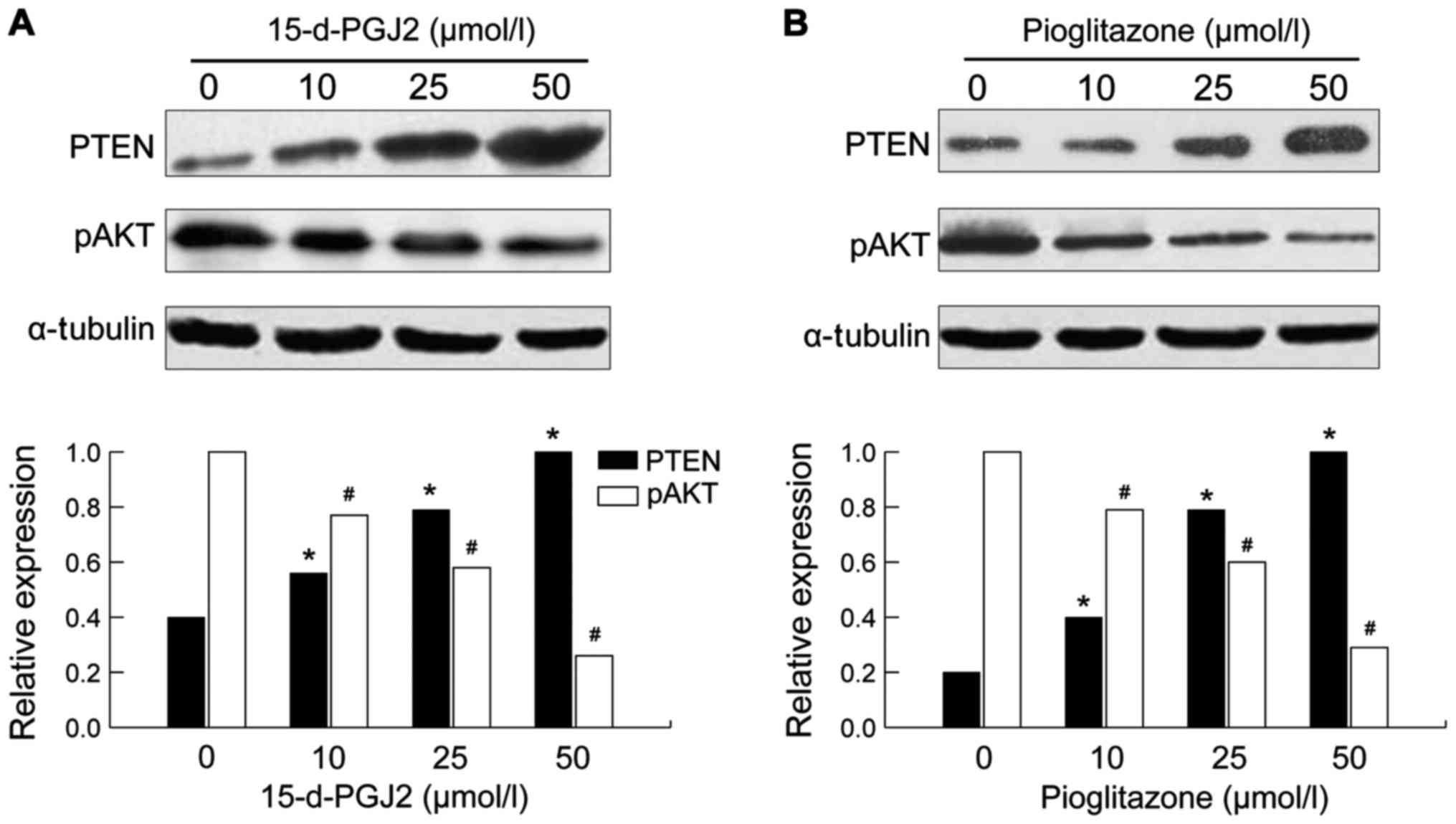|
1
|
Li M, Lee TW, Mok TS, Warner TD, Yim AP
and Chen GG: Activation of peroxisome proliferator-activated
receptor-gamma by troglitazone (TGZ) inhibits human lung cell
growth. J Cell Biochem. 96:760–774. 2005. View Article : Google Scholar : PubMed/NCBI
|
|
2
|
Valentiner U, Carlsson M, Erttmann R,
Hildebrandt H and Schumacher U: Ligands for the peroxisome
proliferator-activated receptor-gamma have inhibitory effects on
growth of human neuroblastoma cells in vitro. Toxicology.
213:157–168. 2005. View Article : Google Scholar : PubMed/NCBI
|
|
3
|
Fenner MH and Elstner E: Peroxisome
proliferator-activated receptor-gamma ligands for the treatment of
breast cancer. Expert Opin Investig Drugs. 14:557–568. 2005.
View Article : Google Scholar : PubMed/NCBI
|
|
4
|
Lu J, Imamura K, Nomura S, Mafune K,
Nakajima A, Kadowaki T, Kubota N, Terauchi Y, Ishii G, Ochiai A, et
al: Chemopreventive effect of peroxisome proliferator-activated
receptor gamma on gastric carcinogenesis in mice. Cancer Res.
65:4769–4774. 2005. View Article : Google Scholar : PubMed/NCBI
|
|
5
|
Toyoda M, Takagi H, Horiguchi N, Kakizaki
S, Sato K, Takayama H and Mori M: A ligand for peroxisome
proliferator activated receptor gamma inhibits cell growth and
induces apoptosis in human liver cancer cells. Gut. 50:563–567.
2002. View Article : Google Scholar : PubMed/NCBI
|
|
6
|
IJpenberg A, Jeannin E, Wahli W and
Desvergne B: Polarity and specific sequence requirements of
peroxisome proliferator-activated receptor (PPAR)/retinoid X
receptor heterodimer binding to DNA. A functional analysis of the
malic enzyme gene PPAR response element. J Biol Chem.
272:20108–20117. 1997. View Article : Google Scholar : PubMed/NCBI
|
|
7
|
Li J, Yen C, Liaw D, Podsypanina K, Bose
S, Wang SI, Puc J, Miliaresis C, Rodgers L, McCombie R, et al:
PTEN, a putative protein tyrosine phosphatase gene mutated in human
brain, breast, and prostate cancer. Science. 275:1943–1947. 1997.
View Article : Google Scholar : PubMed/NCBI
|
|
8
|
Chen WC, Lin MS and Bai X: Induction of
apoptosis in colorectal cancer cells by peroxisome
proliferators-activated receptor gamma activation up-regulating
PTEN and inhibiting PI3K activity. Chin Med J (Engl).
118:1477–1481. 2005.PubMed/NCBI
|
|
9
|
Farrow B and Evers BM: Activation of
PPARgamma increases PTEN expression in pancreatic cancer cells.
Biochem Biophys Res Commun. 301:50–53. 2003. View Article : Google Scholar : PubMed/NCBI
|
|
10
|
Patel L, Pass I, Coxon P, Downes CP, Smith
SA and Macphee CH: Tumor suppressor anti-inflammatory actions of
PPAR gamma agonists are mediated up-regulation of PTEN. Curr Biol.
11:764–768. 2001. View Article : Google Scholar : PubMed/NCBI
|
|
11
|
Okano H, Shiraki K, Inoue H, Yamanaka T,
Deguchi M, Sugimoto K, Sakai T, Ohmori S, Fujikawa K, Murata K, et
al: Peroxisome proliferator-activated receptor gamma augments tumor
necrosis factor family-induced apoptosis in hepatocellular
carcinoma. Anticancer Drugs. 13:59–65. 2002. View Article : Google Scholar : PubMed/NCBI
|
|
12
|
Motomura W, Takahashi N, Nagamine M,
Sawamukai M, Tanno S, Kohgo Y and Okumura T: Growth arrest by
troglitazone is mediated by p27Kip1 accumulation, which
results from dual inhibition of proteasome activity and Skp2
expression in human hepatocellular carcinoma cells. Int J Cancer.
108:41–46. 2004. View Article : Google Scholar : PubMed/NCBI
|
|
13
|
Ma H, Sprecher HW and Kolattukudy PE:
Estrogen-induced production of a peroxisome proliferator-activated
receptor (PPAR) ligand in a PPARgamma-expressing tissue. J Biol
Chem. 273:30131–30138. 1998. View Article : Google Scholar : PubMed/NCBI
|
|
14
|
Han B, Dong Z, Liu Y, Chen Q, Hashimoto K
and Zhang JT: Regulation of constitutive expression of mouse PTEN
by the 5′-untranslated region. Oncogene. 22:5325–5337. 2003.
View Article : Google Scholar : PubMed/NCBI
|
|
15
|
Cantley LC and Neel BG: New insights into
tumor suppression: PTEN suppresses tumor formation by restraining
the phosphoinositide 3-kinase/AKT pathway. Proc Natl Acad Sci USA.
96:4240–4245. 1999. View Article : Google Scholar : PubMed/NCBI
|
|
16
|
Leslie NR and Downes CP: PTEN: The down
side of PI 3-kinase signalling. Cell Signal. 14:285–295. 2002.
View Article : Google Scholar : PubMed/NCBI
|
|
17
|
Stambolic V, Suzuki A, de la Pompa JL,
Brothers GM, Mirtsos C, Sasaki T, Ruland J, Penninger JM,
Siderovski DP and Mak TW: Negative regulation of PKB/Akt-dependent
cell survival by the tumor suppressor PTEN. Cell. 95:29–39. 1998.
View Article : Google Scholar : PubMed/NCBI
|
|
18
|
Zhong H, Chiles K, Feldser D, Laughner E,
Hanrahan C, Georgescu MM, Simons JW and Semenza GL: Modulation of
hypoxia-inducible factor 1alpha expression by the epidermal growth
factor/phosphatidylinositol 3-kinase/PTEN/AKT/FRAP pathway in human
prostate cancer cells: Implications for tumor angiogenesis and
therapeutics. Cancer Res. 60:1541–1545. 2000.PubMed/NCBI
|
|
19
|
Lu Y, Lin YZ, LaPushin R, Cuevas B, Fang
X, Yu SX, Davies MA, Khan H, Furui T, Mao M, et al: The
PTEN/MMAC1/TEP tumor suppressor gene decreases cell growth and
induces apoptosis and anoikis in breast cancer cells. Oncogene.
18:7034–7045. 1999. View Article : Google Scholar : PubMed/NCBI
|
















